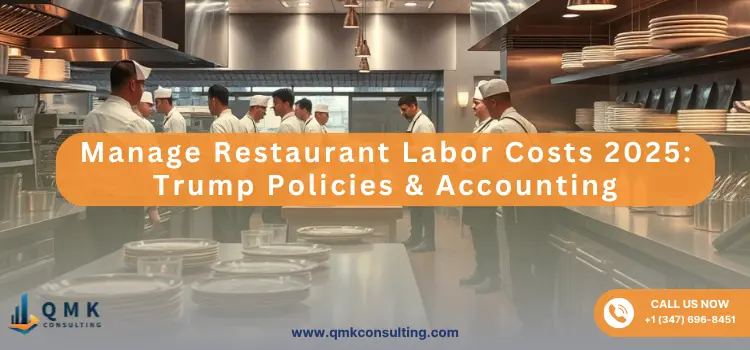
August 4, 2025 |Business Advisory Service


Managing labor expenses has always been a delicate balance for restaurant and franchise owners. But 2025 brings extra challenges—and opportunities—for operators across New York City and the U.S., shaped in no small part by recent Trump administration labor policies and evolving regulations. At QMK Consulting, an accounting firm based in New York City specializing in franchise and restaurant accounting, we’ve fielded countless questions about the impact of these changes—and how to turn compliance into profit.
If you’re a restaurant or multi-unit operator, understanding this shifting landscape isn’t just smart; it’s essential for survival. Here’s what’s new, what’s next, and expert strategies to protect your margins in today’s regulatory environment.
While national politics sometimes feel distant from the day-to-day life of a busy kitchen, policy changes made between 2017 and 2021—and their ongoing interpretations—can quietly reshape your costs, risks, and even your competitiveness in the market.
One defining feature of the Trump strategy is delegating minimum wage legislation to the states. In 2025, this means that what you pay your back-of-house or servers in the Bronx can be dramatically different from wages across the river in New Jersey. New York City’s own minimum wage has climbed—but in many other states, rates remain at the federal minimum.
This patchwork means restaurant accounting can’t be one-size-fits-all. Multi-state operators must keep close tabs on local labor laws, regularly update payroll systems, and run scenario modeling to understand how upcoming changes might squeeze margins.
Another Trump-era policy: rolling back proposed expansions of overtime pay, especially for managers and supervisors. However, with shifting priorities in Washington and rising worker activity, restaurants are also facing a complex and dynamic regulatory landscape. Labor costs can spike overnight if an employee’s status changes—making precise, up-to-the-minute payroll accounting more important than ever.
Trump administration reforms narrowed so-called “joint employer” liability. For restaurant franchisees, this was good news—reducing your exposure to lawsuits stemming from actions by franchisors or third-party contractors. But those rules are under review in 2025, and any reversal could meaningfully impact HR compliance and legal risk for franchisees across the country. If you operate a multi-location brand, now is the time to ensure your labor records, schedules, and wage structures are crystal clear and legally compliant.
The foodservice business may have felt the labor crisis more intensely than any other sector. Immigration enforcement—another focus of the Trump era—remains a flashpoint. Many restaurants have found it harder to recruit and retain staff, leading to increased wage competition, higher overtime, and greater reliance on compliance-ready accounting to stay ahead of regulatory risks.
Tip pooling rules were relaxed under Trump’s Department of Labor, allowing more flexibility for businesses—but also creating new compliance pitfalls. When tips are handled improperly, there may be audits, penalties, and upset staff members. In 2025, with regulatory attention on wage fairness, precise and transparent payroll accounting is non-negotiable.
So, what’s a restaurateur to do? Here’s what we recommend for those who want to stay ahead:
Modern accounting platforms (think cloud-based systems, integrated with your POS) now track labor costs by shift, region, and role in real-time. This enables instant visibility into overtime trends, wage variance, and scheduling gaps—empowering data-driven decisions before payroll becomes a problem.
Monthly or quarterly “labor checkups” with your accounting team help spot compliance risks, avoid surprise costs, and project future needs. With Trump-era rules continuing to evolve, proactive auditing is every bit as valuable as a busy Friday dinner rush.
As labor costs rise, restaurants are reworking menus to favor high-margin items and reduce prep complexity. Limited-time offers and streamlined service models can ease the pressure on payroll—and strengthen your brand’s value proposition.
With regulators and employees watching closely, airtight tip management, detailed wage records, and well-documented scheduling can set your brand apart. It’s not just about avoiding trouble—it’s about building trust with your team and guests alike.
Especially in franchising, collaboration between local operators, accounting advisors, and corporate HR is crucial. Establish clear lines for wage policy, joint employer concerns, and shared compliance tools to avoid costly surprises.
For the majority of restaurants, labor is the most adjustable expense. In a city as competitive as New York—and a market as dynamic as 2025—mastering your labor strategy is about more than penny-pinching. It’s about resilience, compliance, and creating a foundation for growth.
At QMK Consulting, we specialize in helping restaurant and franchise operators not just meet today’s requirements, but anticipate tomorrow’s profit opportunities. Mohamed Karmous, our Franchise Accounting Expert and Restaurant Accounting Advisor, brings his extensive experience to every client engagement—from the smallest local spot to the fastest-growing multi-unit brand.
Get a free analysis of your cash flow and profit from QMK Consulting's licensed accountants and Mohamed Karmous. Let’s uncover hidden savings, spotlight compliance opportunities, and chart a path to a healthier bottom line—customized for your restaurant or franchise, right here in New York City.
QMK Consulting: Your Partner for Professional Franchise Accounting in 2025 and More.
Book your free analysis today and future-proof your restaurant’s success.